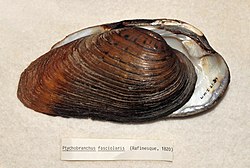| Ptychobranchus fasciolaris | |
|---|---|
 | |
| Scientific classification | |
| Kingdom: | Animalia |
| Phylum: | Mollusca |
| Class: | Bivalvia |
| Order: | Unionida |
| Family: | Unionidae |
| Genus: | Ptychobranchus |
| Species: | P. fasciolaris |
| Binomial name | |
| Ptychobranchus fasciolaris (Rafinesque, 1820) | |
Ptychobranchus fasciolaris is a species of freshwater mussel in the family Unionidae, the river mussels. Its common name is kidneyshell.
